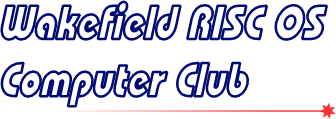Meeting: R-Comp
Andrew Rawnsley of R-Comp and R-Comp Interactive talked about and demonstrated their latest hardware and software developments.
Report by Peter Richmond
After a bit of a problem trying to find a USB keyboard (note to committee: perhaps we ought to have a spare...), Andrew Rawnsley from R-Comp started to update us on many of their products.
First off was the ARMini, which is a much expanded and professional small format computer based on a Beagleboard and running RISC OS 5. The operating system and associated software for this computer has been updated five times in the last twelve months, to the point where it can now be seen as a replacement for an Iyonix given the range of applications that it can now run – particularly since availability of the A9home has been erratic.
Some of the software updates have been to make more use of the hardware. Originally the ARMini ran at 800MHz, but a software upgrade took that up to 1GHz! There is now full support for built in DVD drives, which with the appropriate software can extract audio from CDs digitally. The software available with it includes Aemulor Pro, which allows many older titles to run correctly – such programs include Eureka and the Impression range. There is now also included a program which provides an ‘Acorn Mode’, and as such will run the vast majority of software from the RISC OS 3.1 era: Andrew kindly showed us a few examples. As was pointed out, with the software now available for the ARMini the three ages of RISC OS can be run: RISC OS 3.1, RiscPC era, and post-RiscPC – pretty much any software.
Musical conversions
Andrew then went on to look at MusicMan 2, which is a much expanded version of their previous program to convert audio from CDs into many formats. Of these FLAC is the one most used by Hi-Fi enthusiasts, but it also has the ability to export to WAV, Ogg, MP3 and a number of other formats. The update involved quite a rewrite, since the audio from CD and DVD drives on modern systems comes out digitally rather than in an analogue way as it did up to the Iyonix era. Audio track data (titles and artists) is collected from the internet by FreeCD.
While looking at this conversion, Andrew worked with a number of Hi-Fi companies on a standard for holding audio metadata within various audio formats, with WAV being the one that was the most important and difficult to do. For those of you that aren’t familiar with the term, metadata is data about the music file – which may include track length, date of recording, artist, song title and so on – and which is used on the display of a digital Hi-Fi audio players to give more information about the current track. As such, some companies in the Hi-Fi world are now using ARMinis to digitise audio and create such metadata – apparently this program on RISC OS beats all other current programs on all other operating systems: quite a feather in R-Comp’s hat!
Next on the agenda was a look at Fireworks Pro. This is a capable application which was re-issued last year and includes a word-processor, spreadsheet, database and graphics. It originally had its own style, but since the programmer has been working with R-Comp it has been made to be more RISC OS style compliant. The other main change over the year has been Excel import, which includes workbooks and all the variants within the .xls file format. Documentation and examples have been greatly improved, and the next big point that is being looked at as a priority for an upgrade is Excel export.
A RISC OS software store
We were then shown a new concept in the RISC OS world: the Pling Store. You may be able to guess what this will cover, but not necessarily how. Andrew reasoned that since a number of RISC OS devices no longer have physical ‘drives’, but are internet connectable, then a ‘store’ where software could be downloaded, either for free or paid, would be a useful resource for programmers wishing to reach a larger audience and also for consumers wanting to have a ‘one stop shop’. Obvious targets for this store are Beagleboards and Raspberry Pis, but in fact it has been designed for any computer running RISC OS with an internet connection.
Initially programs that can be downloaded will be public domain, but R-Comp are hoping to have on-line credit card transactions available by the end of September 2012. The way that it works is that you download the PlingStore ‘app’, which contains a searchable database where you can search for titles by author, name, genre, commercial or free. When you make a choice, the app then gives further details of what the software can do from the R-Comp database, sometimes with examples, and often allowing a free-use demo. Pricing and file size are also given. Where possible links are given to the relevant company’s website and contact details. All this appears to be quite transparent to the user: they don’t have to open a web browser and it even goes to the extent of un-zipping programs so they are ready to run. This is seen as a great advantage for newcomers to the RISC OS scene.
It was hoped that by having a version of RISC OS available for the Raspberry Pi that previous RISC OS programmers may return to the fold, new programmers may take up RISC OS, and overall, that there would be much more of a global awareness of RISC OS. R-Comp have been talking to a number of RISC OS companies, with the intention of getting them on-board for the commercial launch of the site.
Running old software
Aemulor Pro was the next topic, with Andrew acknowledging that people won’t buy a new computer unless it will run all the software they’re used to using and also run it at least as quickly as their old machine. As an example, Andrew ran Impression Publisher Plus (Publisher works just as well) and this was just as fast as on an Iyonix, and for large files, far quicker than a RiscPC. Just some of the programs that could be run included Eureka, Animator, CineWorks, StudioSound, ProArt24, GraphMate, TableMate, Compo and Copernicus.
We were then given a quick overview of the PC-based solutions that R-Comp provide in the form of laptops and RisCubes which run Virtual Acorn. For some people, having a laptop with the availability of RISC OS allows them the mobile solution that they’ve been looking for. Conversely the RisCubes give good PC performance in a small desktop format. These PCs do not have to run Windows 7, but can be set up with Linux or Windows XP. These computers can be fitted with a Solid State Drive (SSD) instead of a hard drive, with 128Gb being a popular price/performance option. The SSD allows much faster boot times, with less power consumption.
A question came from the audience about the relative speed of the ARMini compared with using Virtual Acorn on one of R-Comp’s PCs. We got a quick demo which showed that they are very similar, and Andrew commented that because of the way Virtual Acorn works, it only uses one processor core on multi-core machines and hence hasn’t really got any faster over recent years – it may run faster during memory intensive processes due to the speed of the PC subsystems.
Next we were given a quick run through of an Android Tablet which R-Comp sell. Although it does not run any form of RISC OS, files can easily be transferred between itself and an ARMini, Iyonix or modern PC. It runs Android 4.0 on a Cortex A8 processor (similar to the ARMini) with a capacitive screen. It’s ideal for web browsing and taking sound, pictures and movies wherever you go, and is Flash enabled for looking at sites like the BBC iPlayer and YouTube. There is also a suite of business software to let you look at and modify the normal Microsoft files. Other software includes a calendar, and it can be used for email on the go. As standard it has Wi-Fi fitted, but a GSM dongle can be used for internet outside of Wi-Fi areas. There is also a case with mini-keyboard option, for those who prefer typing with real keys.
Finally, there were a few questions from the audience which involved printing from the ARMini. Gutenprint was discussed, and can be used on the ARMini, but Andrew felt that normally their Uniprint software would give quicker printing results if a real PC was available.
It was quite an information-packed evening with lots of interesting developments, which explain why R-Comp remain one of our main sales and development companies. If you need more information, visit the R-Comp or ARMini websites.







